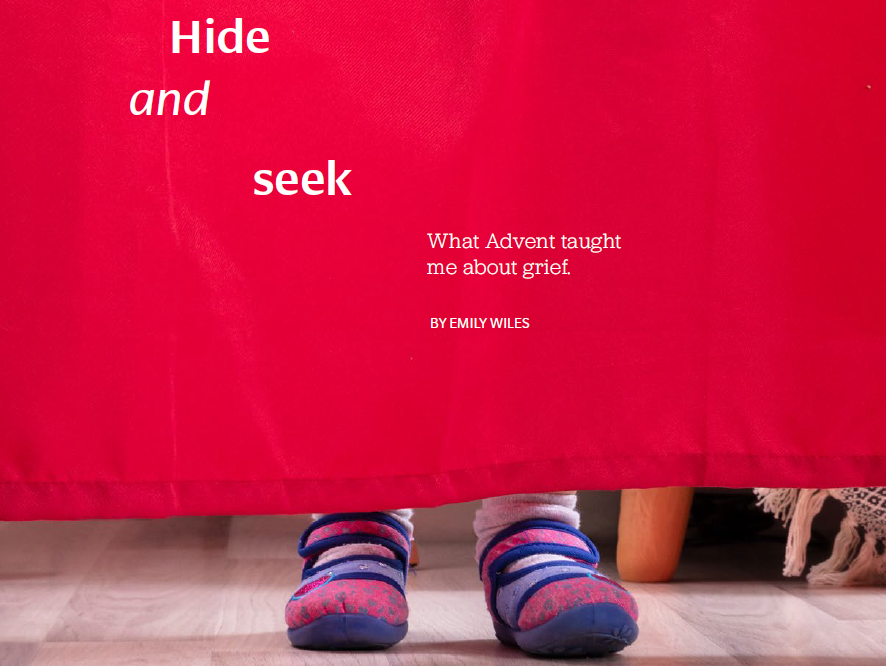by Lisa A. Smith
WHEN I WAS A CHILD, I thought the Ten Commandments weren’t for me. I considered myself a responsible and rule-keeping kid, and these rules seemed so easy. Since I hadn’t murdered anyone, stolen anything, worshiped Babylonian gods or coveted anyone’s oxen, I felt I had passed—no, aced—the test.
Fast forward to seventh grade confirmation class at a small Lutheran congregation in rural Iowa. Our class sat, squirming, around a table in the dim basement of the parsonage, while the whitehaired pastor, who seemed ancient to me, droned on about covenants and coveting. When he made us memorize Luther’s entire Small Catechism, I did so perfectly because I considered myself a “good kid.” (Some of the others cheated by hiding the catechism under the table and glancing at it.)
UNCOMFORTABLE EPIPHANY
Everything was fine until I got to Luther’s explanation of the Ten Commandments. Here was an uncomfortable epiphany: It wasn’t enough to keep the commandments in a literal fashion and master the list of “you shall nots.” Luther also provided imperatives on how we shall live. Take the 5th commandment, for example. I hadn’t killed anyone, but even as a seventh grader I could see how I had failed to “help and support” my neighbor in every physical need. I realized that the commandments were for me, and I had failed, and I was going to keep failing.
It was a bit of a downer. That’s how we sometimes view the commandments— as a downer, a killjoy, an unwelcome burden that keeps us from living our lives as we please. Commandments, like other rules, are boundaries, and something in us makes us push boundaries. It’s not necessarily a bad thing. Children do this as a part of normal social and emotional development, a way to test limits and self-differentiate.
The thing about boundaries, though, is that we do need them. Boundaries create a hedge against chaos, helping children feel safe. When they are set and gently enforced by a loving caregiver, boundaries make for a well-adjusted child. Boundaries teach us that someone cares enough for us, to not let us slip into the void.
My children’s preschool introduced me to the Montessori concept of freedoms and responsibilities.
The many freedoms surprised me. Children choose their own work projects from a collection of options, completing these in the order they choose, working at their own pace. They move freely about the classroom as they do this. They can talk quietly with others and sit with whomever they wish, wherever they wish—table, floor, hall or cushions. This was nothing like my early education with its rows of desks, lectures and endless worksheets. How could anyone learn anything in this chaos?
It turns out that children learn pretty well. That’s because with Montessori freedom comes responsibility—to be respectful, to speak quietly so others may concentrate, to choose challenging work that is appropriate to your level, and to stay on task. When children demonstrate responsibility—which is not just about them, but about others as well—they enjoy freedoms. Freedom and responsibility are another way to look at boundaries.
IT’S ABOUT RELATIONSHIP
The writer of Psalm 1 says, “Happy are those who do not follow the advice of the wicked… but their delight is in the law of the Lord…” (vv. 1-2). I used to think that was a silly way to start out the book of Psalms. Boundaries and rules are essential for a functioning society, but they don’t exactly make us “happy,” do they?
Then I learned that the Hebrew word translated as “happy” in Psalm 1:1 can also mean something more like “blessed.” That shifted things for me. I do see the blessings in a God who gives us boundaries out of love, so we can live in community. When we try, though imperfectly, to keep the commandments, we find freedom in our relationships with others.
Today, using the language of relationship, I can teach the Ten Commandments to my children in a way that goes beyond giving them a list of rules to memorize. Years ago, as a new pastor, I was nervous about teaching the sixth commandment (adultery) to a class of confirmation students. I awkwardly
rambled on about boundaries and covenants. A sweet 12-year-old girl raised her hand, and said: “Pastor Lisa, I have no idea what that was about.”
Funny how everything comes full circle, isn’t it? I should have just talked about how we treat people in relationships. Relationship-based language helps with all the commandments—including those that can be harder to explain to children.
The Ten Commandments are a launch pad for great conversations with children. Take the first commandment, “You shall have no other gods,” which as Martin Luther explains, means: “We should fear, love and trust God above all things.”
We can talk with children about things that become a “god” for us—things like money, power, social position, technology, corporate entities and even political figures. We can share our own struggles as adults. For example, what about the false gods that entice us into masquerading as noble? What about the “gods” of being the perfect mom…maintaining an idyllic household… having a perfect work ethic… or our own wisdom?
There is a kernel of truth in what I first thought about the Ten Commandments: They aren’t for me.
They are never about just one person, singular. They aren’t for me, because the 10 Commandments are for us, plural. Every one of the Ten Commandments keeps us in right relationship with God or with others. What sweet freedom we find in these relationships!
I’m reminded of a line from an Indigo Girls’ song, Power of Two: “And the closer I’m bound in love to you, the closer I am to free.” God’s gift of the Ten Commandments frees us to live as God intended—bound by the support, love, nurture and peace of loving relationships.
The Rev. Lisa A. Smith is an ELCA pastor who loves exploring the wilderness near her Northwest U.S. home. She blogs at pastorlisawrites.com.
This article appears in the March/April 2023 issue. To read more articles like it, subscribe to Gather.

Feeling homesick
Moving in, moving on By Susan K. Olson BY THE TIME THE MIDDLE of September hits, the college...

Hide and seek: What Advent taught me about grief
By Emily Wiles WHEN I WAS YOUNG, I was a champion seeker in the game of hide and seek. I had an...

Go-to places for sacred spaces
By Kathryn Haueisen— I’m embarrassed about how many times I’ve changed my address. Sometimes I’ve...



I think of the Commandments as a Guide as to how we are to live our lives.